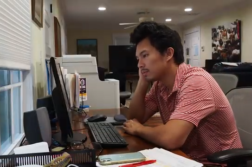ORLANDO, Fla. (Ivanhoe Newswire) – Around the world, more than 264 million people of all ages suffer from depression and 284 million suffer from anxiety, and many of them may not even know it! While mental health awareness is growing, many signs of decline are easy to overlook. Experts say we should do self-help checkups on our minds the same way we do our bodies, even if we feel okay.
How are you?
It’s something we ask each other every day. But after a long year of stress and tension you may be asking yourself ‘Am I okay?’
“We have to look deep inside, I think, and ask ourselves ‘honestly what am I struggling with’ and it’s not often the obvious thing,” David Baker, Ph.D., LLC, a psychotherapist and performance management consultant, told Ivanhoe.
Start by asking yourself big picture questions. Do your self-help checkups.
“Why am I having anxiety,” Baker said. “Why am I having depression?”
Experts suggest taking a moment alone to reflect: am I still enjoying my hobbies and interests? Am I avoiding the people I love? Am I getting annoyed very easily? How have I been adapting?
“You have to get to a point mentally … emotionally where you are not so flooded with feeling or thought that you can ask those questions,” Baker acknowledged.
Mental health experts advise paying attention to ways your body may be telling you something is wrong. Signs like trouble sleeping, loss of appetite, grinding or clenching teeth, holding tension in your shoulders, or becoming less active.
“If you had just a year to live what would you do differently,” Baker remarked.
Don’t wait until things get bad. Protect yourself now to avoid burn out or crisis later. You can even take your own mental health screening test right now on the Mental Health America website.
Experts also say to consider the length and duration of your symptoms. Everyone has bad days, but if you’re feeling down for more than two weeks at a time, it may be time to seek professional help.
Source:
https://www.who.int/news-room/fact-sheets/detail/depression
Contributor(s) to this news report include: Sabrina Broadbent, Producer; Robert Walko, Videographer; Robert Walko, Editor.
To receive a free weekly email on Smart Living from Ivanhoe, sign up at: http://www.ivanhoe.com/ftk



